

Artificial Intelligence MSc. AI research is interdisciplinary by nature and draws on neuroscience, cognitive science, linguistics, computer science, mathematics and statistics, psychology.
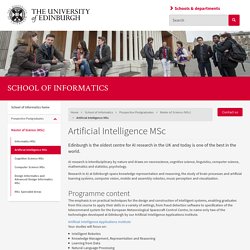
Research in AI at Edinburgh spans knowledge representation and reasoning, the study of brain processes and artificial learning systems, computer vision, mobile and assembly robotics, music perception and visualization. The emphasis is on practical techniques for the design and construction of intelligent systems, enabling graduates from this course to apply their skills in a variety of settings, from fraud detection software to specification of the telecommand system for the European Meteorological Spacecraft Control Centre, to name only two of the technologies developed at Edinburgh by our Artificial Intelligence Applications Institute. Your studies will focus on: Intelligent Robotics Knowledge Management, Representation and Reasoning Learning from Data Natural Language Processing. Master Artificial Intelligence. Artificial Intelligence - Master. Artificial Intelligence is a fast-paced and challenging field that is making visible inroads into our everyday life.
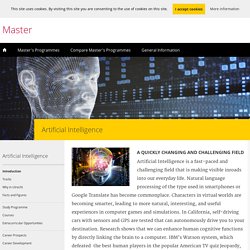
Natural language processing of the type used in smartphones or Google Translate has become commonplace. Characters in virtual worlds are becoming smarter, leading to more natural, interesting, and useful experiences in computer games and simulations. In California, self-driving cars with sensors and GPS are tested that can autonomously drive you to your destination.
Research shows that we can enhance human cognitive functions by directly linking the brain to a computer. IBM’s Watson system, which defeated the best human players in the popular American TV quiz Jeopardy, shows that large-scale knowledge based systems can have practical use. The Master’s in Artificial Intelligence offers you an integrative and cutting-edge approach to the field from the viewpoints of Informatics, Logic, Cognition, Psychology, Philosophy, and Linguistics. Students can choose from three tracks: Master in Artificial Intelligence - Barcelona School of Informatics - FIB - UPC - BarcelonaTech. Compulsory courses (33 ECTS credits) Computational Intelligence (CI), UPC Computational Vision (CV), UB Intelligent Data Analysis Applications in Business (IDAAB), UB Introduction to MultiAgent Systems (IMAS), URV Introduction to Machine Learning (IML), UB Introduction to Natural Language Processing (INLP), UPC Planning and Approximate Reasoning (PAR), URV Elective courses The elective courses are grouped in intensifications.
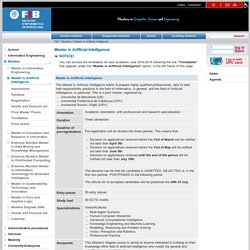
Students must take courses from different intensifications, with a minimum total of 39 ECTS credits. MultiAgent Systems (13 ECTS credits): Artificial Intelligence - Graduate Schools of Science - University of Amsterdam. Artificial Intelligence is widely adopted in our society: control mechanisms in airplanes, smart cameras and surveillance systems or robotics in industry.
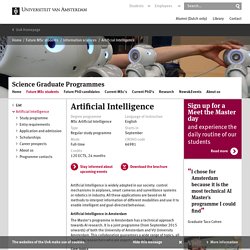
All these applications are based on AI methods to interpret information of different modalities and use it to enable intelligent and goal-directed behaviour. Artificial Intelligence in Amsterdam The Master's programme in Amsterdam has a technical approach towards AI research. It is a joint programme (from September 2015 onwards) of both the University of Amsterdam and VU University Amsterdam. This collaboration guarantees a wide range of topics, all taught by researchers who are experts in their field. Stanford Computer Science. Stanford > CS > Master’s Degree > Specializations As an MSCS student, you must choose one of ten predefined specializations, or a combination of any two specializations (dual depth).
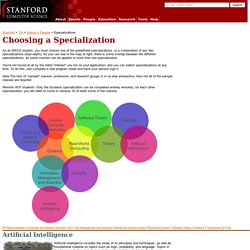
As you can see in the map at right, there is some overlap between the different specializations, as some courses can be applied to more than one specialization. You’re not bound at all by the initial "interest" you list on your application, and you can switch specializations at any time. To do this, just complete a new program sheet and have your advisor sign it. Note:The lists of "sample" classes, professors, and research groups is in no way exhaustive.
Remote HCP students: Only the Systems specialization can be completed entirely remotely; for each other specialization, you will need to come to campus for at least some of the classes. Master informatique : spécialité ANDROIDE. Master informatique : spécialité IAD. Objectifs et description La spécialité "Intelligence Artificielle et Décision" (IAD) dispense un enseignement théorique et pratique qui couvre les principaux domaines de l'intelligence artificielle et de l'aide à la décision, en particulier : les agents adaptatifs et les agents décisionnelsl'apprentissage et la fouille de donnéesl'optimisation et la résolution de problèmesles bases de donnéesle traitement d'informations multimédiales interactions hommes/machine La spécialité IAD entretient des relations privilégiées avec plusieurs grandes écoles (Telecom ParisTech, l'ENSTA ParisTech et l'ensIIE) et les associe dans l'enseignement.
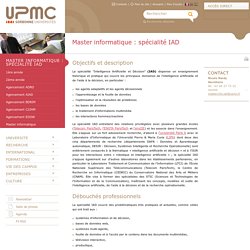
Débouchés professionnels. Master "Systèmes intelligents et communicants" - Equipes Traitement de l'Information et Systèmes. Responsable : Philippe Gaussier La spécialité recherche Systèmes Intelligents et Communicants vise à former des étudiants aux techniques les plus récentes en matière de traitement numérique de l’information, depuis le capteur jusqu’à la prise de décision.
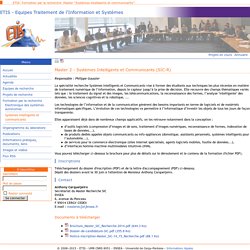
Elle recouvre des champs thématiques variés tels que : le traitement du signal et des images, les télécommunications, la reconnaissance des formes, l’analyse "intelligente" des données, les sciences cognitives et la robotique, ... Les technologies de l’information et de la communication génèrent des besoins importants en terme de logiciels et de matériels informatiques spécifiques.
L’évolution de ces technologies va permettre à l’informatique d’investir les objets de tous les jours de façon transparente.